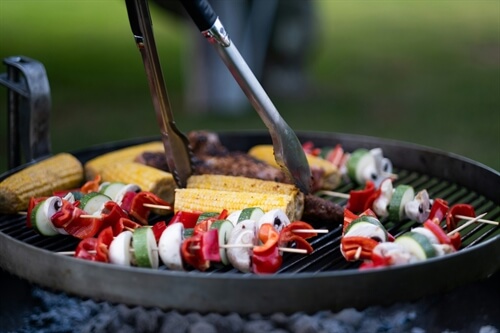You might get a few more outside meals during September, but it won’t be long before casually throwing a few sausages and burgers on the barbie seems less appealing than it did. Cleaning up your barbecue grills and equipment now will ensure they are ready for action as soon as the summer weather rolls around again.
Why clean your barbecue?
Some barbecue cooks argue that grills don’t need cleaning because the grime gets burnt off during cooking. However, other experts say that the sludge that accumulates on barbecue grills contains carcinogens which can transfer to the food you’re serving. Food is less likely to stick to a clean grill; so starting with a grill free from ash and grease should make your cooking tasks easier.
At the very least, it’s worth scraping the grills to remove residue and ash after each barbecue. Cleaning your barbecue ‘little and often’ will mean you won’t have too much of a hard task at the end of the season.
Where to get tips on cleaning your barbecue
Check the instructions that came with your barbecue equipment to see if there are any specific steps that you need to take to clean and protect your grills and barbecue tools. Electric and gas barbecues will almost certainly have instructions that you should follow to avoid damaging your outdoor cooking equipment.
It should go without saying – but we’re going to say it anyway: wait until your barbecue is cold before attempting to clean it; and disconnect the gas supply (where applicable).
Disposing of ash from your barbecue
Cold ash from a charcoal barbecue can be disposed of with compost; or with general waste. Pieces of charcoal that are not burnt to ash could be re-used at your next barbecue if you want to be cost-effective and sustainable.
What should I use to clean my barbecue?
Your usual dishwashing liquid and plenty of hot water are the best things to use when cleaning a barbecue. There are specialised grill cleaning liquids available, too – but dishwashing liquid works well enough. Some people swear by bicarbonate of soda and vinegar as natural cleaners. They will fizz up and neutralise each other if you use them together. But separately, vinegar is good at cutting grease; while bicarb has a scouring action.
Use a grill brush to clean the grates of your barbecue. Tools like oven scrapers, wire brushes and scourers might be useful in cleaning your barbecue – but take care to avoid damaging any finishes.
Degrease the outside of your barbecue with hot water and dishwashing liquid on a soft cloth – microfibre cloths work well for this.
Rinse everything thoroughly to avoid tainting your barbecued food with soap.
Can I put a barbecue in the dishwasher?
Some barbecue components are dishwasher safe: it’s best to refer to the manufacturer’s instructions to better understand this. Dishwashers can be hard on metal items, so use a gentle programme, and be aware that putting your barbecue in the dishwasher might shorten its life.
Drying your barbecue
Dry your barbecue before storing it – this will protect it from rust and prevent musty odours. You can dry the grills of gas barbecues by turning the burners on to medium for a few minutes and then allowing the grills to cool. Some barbecue sets benefit from oiling before storage – refer to the manufacturer’s instructions.
For more information about cleaning a barbecue, see this content by consumer guide Which?
Check your barbecue for faults
Once the cleaning is done, look over your barbecue to make sure everything is working as it should. Make any small repairs, and order replacement parts.
Where should I store my barbecue?
If you won’t be using your barbecue for a while, keep it somewhere dry and sheltered from wet and cold weather. If you don’t have space for your barbecue at home, why not keep it in your storage unit until next summer?
Should I insure my barbecue?
Most barbecues are covered under home contents insurance. When you keep a barbecue in your self-storage unit, it will be included in your self-storage insurance policy (and if it’s not, switch to Store and Insure, as our policy covers all your stored domestic goods).



